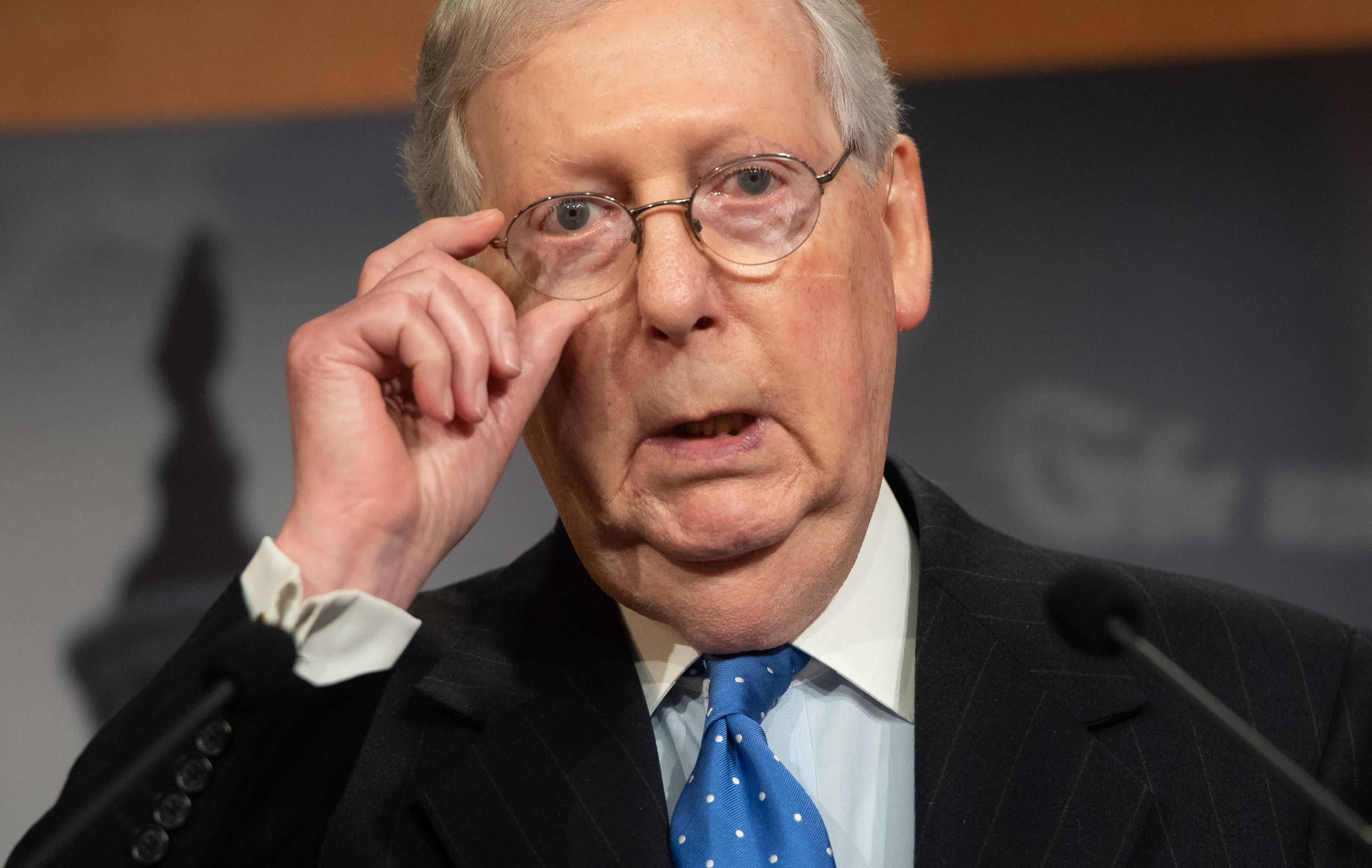
US Senate Majority Leader Mitch McConnell, Republican of Kentucky, holds a press briefing about legislation in response to the novel coronavirus, COVID-19, at the US Capitol in Washington, DC, March 17, 2020.
Saul Loeb | AFP | Getty Images
Executives at companies that would receive bailout cash from the coronavirus-relief bill unveiled by Senate Republicans on Thursday would see their annual compensation capped for two years.
According to the language, no employee who makes more than $425,000 may get a raise in their salary for two years.
The legislation would also allow the government a chance to make money off its investments in these firms.
Under the proposal, the American airline industry would receive $50 billion, cargo air carriers would get $8 billion, and other ailing industries would get $150 billion. The money for cargo air carriers was an addition to the White House’s original proposal, a person familiar with the situation told CNBC.
Senate Republicans now must negotiate the terms of the final bill with their Democratic counterparts, as well as with lawmakers in the Democratic-controlled House.
According to the measure, no executive at a company receiving money may make more than $425,000 in total annual compensation for two years, retroactive to March 1.
Company employees whose salary has already been determined through collective bargaining agreement may be exempt from that restriction. That likely applies to the union workers at companies accepting aid.
Politicians on both sides of the aisle have acknowledged a need to offer aid to industries like the airlines, for fear their fall would eliminate jobs for thousands of workers. But Democrats have warned against any corporate aid that appears to be lining the pockets of executives. Republicans have worried about the appearance of flagrant spending.
“We are not talking about a taxpayer-funded cushion for companies that made mistakes,” said Senate Majority Leader Mitch McConnell earlier Thursday on the Senate floor.
“We are talking about loans, which must be repaid, for American employers whom the government itself is temporarily crushing for the sake of public health,” he said.
Governments from the federal to the local level have called on people to practice social distancing and avoid unnecessary travel from their homes in a bid to limit exposure to the coronavirus and slow the pace of its spread. In turn, airlines have slashed capacity dramatically, and the hospitality industry has seen business plummet.
Layoffs have already started to spike, according to unemployment claim data released Thursday. The worst is likely yet to come.
Senate Democratic Leader Chuck Schumer (D-NY) holds up a copy of Congressional Democrats infrastructure proposal as he and House Speaker Nancy Pelosi (D-CA) speak to reporters at the U.S. Capitol after a failed meeting with U.S. President Donald Trump to discuss infrastructure at the White House in Washington, U.S., May 22, 2019.
Jonathan Ernst | Reuters
The bill also states the government has the right to “participate in the gains” of businesses to which it is lending. That could be through warrants, stock options, common or preferred stock, or other equity tools.
President Donald Trump said Thursday he would consider taking an equity stake in companies accepting federal aid, a move that would ultimately dilute shareholders. Trump didn’t specify which companies he was referring to but called out those that have bought back stock. Delta, American, Southwest and United airlines have collectively spent about $39 billion over the last five years buying back shares.
Democrats have said they may push for more restrictions, like forbidding stock buybacks. Trump himself said he would be “OK” with such a stipulation.
House Speaker Nancy Pelosi, D-Calif., and Senate Minority Leader Chuck Schumer, D-N.Y., said in a joint statement: “Any economic stimulus proposal must include new, strong and strict provisions that prioritize and protect workers, such as banning the recipient companies from buying back stock, rewarding executives, and laying off workers.”
Airlines for America, a lobbying group that represents U.S. airlines including Delta, American, United and Southwest, earlier this week issued a dire warning about the industry, saying its “survival” depends on government aid. The group originally requested $25 billion in direct grants and another $25 billion in loans.
The hotel and tourism industry, meantime, has requested $150 billion in direct grants.
Trump himself owns several hotels and resorts.
-CNBC’s Leslie Josephs contributed to this report.
Leave a Reply